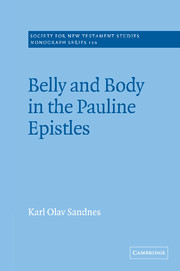Book contents
- Frontmatter
- Contents
- Preface
- Abbreviations
- Part 1 Prolegomena
- 1 Introduction, previous solutions, method and Pauline context
- Part 2 The Graeco-Roman belly
- Part 3 The appropriated belly
- Part 4 Belly-worship and body according to Paul
- Part 5 The earliest expositors of Paul
- Part 6 Conclusions
- Bibliography
- Index of modern authors
- Index of Graeco-Roman sources
- Index of Old Testament, Apocrypha, Pseudepigrapha and other Jewish writings
- Index of New Testament and early Christian writings
1 - Introduction, previous solutions, method and Pauline context
Published online by Cambridge University Press: 22 September 2009
- Frontmatter
- Contents
- Preface
- Abbreviations
- Part 1 Prolegomena
- 1 Introduction, previous solutions, method and Pauline context
- Part 2 The Graeco-Roman belly
- Part 3 The appropriated belly
- Part 4 Belly-worship and body according to Paul
- Part 5 The earliest expositors of Paul
- Part 6 Conclusions
- Bibliography
- Index of modern authors
- Index of Graeco-Roman sources
- Index of Old Testament, Apocrypha, Pseudepigrapha and other Jewish writings
- Index of New Testament and early Christian writings
Summary
Introduction
The commonest terms for stomach in ancient writings (κοιλία and γαστήρ) occur in the following texts in the undisputed Pauline epistles: 1 Thess. 5:13; Gal. 1:15; Phil. 3:19; 1 Cor. 6:13; Rom. 16:18. The first instance refers to pregnancy. Gal. 1:15 is a related text. Kοιλία means ‘womb’, and refers to the point where life begins according to Biblical thought (cf. Jer. 1:15; Jub. 21:8; Lib. Ant. 9:2.5; 22:3). Paul's reference to his mother's womb is embedded in a topos of vocation, aimed at justifying his divine call. A rather different meaning appears in Paul's dicta on the stomach-devotees in Phil. 3:19: ‘Their end is destruction; their god is the belly; and their glory is in their shame; their minds are set on earthly things’ and Rom. 16:18: ‘For such people do not serve our Lord Christ, but their own appetites …’ In the last instance, NRSV renders κοιλία as ‘appetite’. The two references are either polemical or a warning against people who are devoted to their belly. In other words, they belong to a different rhetoric. This study claims that they are similar to the Greek saying of Tit. 1:12, about the Cretans whose entire personality is their stomachs.
It is the aim of the present study to substantiate there being a rhetoric of the belly in Paul's letters, and also to see how it works. Since for obvious reasons 1 Cor. 6:13 has nothing to do with either pregnancy or vocation, it will be investigated as part of Paul's rhetoric of the belly.
- Type
- Chapter
- Information
- Belly and Body in the Pauline Epistles , pp. 4 - 22Publisher: Cambridge University PressPrint publication year: 2002



